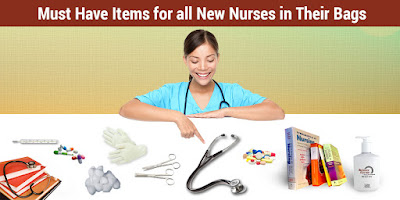Are you a nursing student or maybe a new nurse? While communication skills, compassion, empathy, flexibility, emotional stability, and interpersonal skills are some of the must have qualities of a nurse, what all do you keep in your bag? Yes, your bag. Almost all of us keep stuff that tends to signify us to the greatest extent. Are you wondering what all is required in your bag in order to indicate you as a nursing student or a nurse?
1. Do You Have a Stethoscope With You?
Probably, one of the most prized possessions of a nurse. A stethoscope does not only help in listening to the heart, but also the veins and the intestines. These days we can get a plethora of variety in stethoscopes, from the older technology to the latest and the advanced. Classic or the up-to-the-minute, a stethoscope is necessary item for a nurse.2. Another Must Have Item – Thermometer
We all know thermometers are used to measure temperature or a temperature gradient. Nurses use a thermometer to measure the temperature of the patients' body and register it. One of the second most useful items a nurse should have in order to examine the health of the patient.3. Do Not Forget About the Sanitary Items!
Sure, you keep them-- Gauze
- Sterilized Mask
- Gloves
- Cotton Balls
4. Also, the OTC (Over the Counter) Pharmacy Items
- Cold Medicines
- Paracetamol
- Pain Killers
- Ibuprofen
- Other emergency medicine
5. The Need for Scissors and Microscope Medical Tape
Whenever there is a question of wound care, scissors and microscope medical tape are the saviors. The scissor is used in the quest for cutting the medical gauze, bandages and dressings. As a nurse, you may come across many such emergencies when there is a need for scissors. Microscope medical tapes always help while accidents like pulling IV micro-drip adapter of patients happen.
Do you have all this stuff in your bag? Keep checking this space to know what else is required in your bag being a nursing student or a nurse new to the profession. Until then, you can check the Nursing Courses offered by INSCOL in various countries such as Canada, UK, USA, NZ, Philippines and Australia. Shine on!



